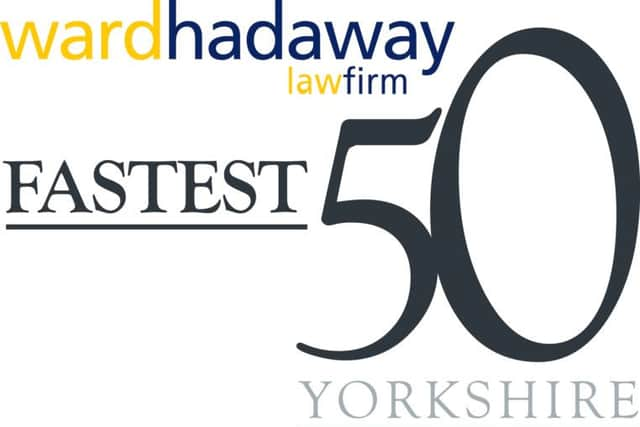Fast growing firms face 'uphill task' as they prepare for apprenticeship levy


The Government is introducing a levy on UK employers to fund new apprenticeships as part of its strategy to boost productivity by investing in training.
According to the Government, the levy will help to deliver new apprenticeships and support quality training, by putting employers at the heart of the system.
Advertisement
Hide AdAdvertisement
Hide AdHowever, employment experts at the law firm Ward Hadaway believe that a lack of clarity from the Government is causing problems for businesses as they get ready for the introduction of the apprenticeship levy.


From April 6, all UK companies and organisations with a pay bill of more than £3m a year will need to spend 0.5 per cent of their total pay bill on the apprenticeship levy, minus a ‘levy allowance’ of £15,000 per year.
The funding will be pooled and then made available to be accessed by employers to pay for apprenticeships.
However, while businesses are aware that the apprenticeship levy is coming, many are not prepared for how their companies will be affected, with fast-growing medium-sized businesses particularly badly hit.
Advertisement
Hide AdAdvertisement
Hide AdHarmajinder Hayre, a partner in the employment team at Ward Hadaway’s Leeds office, said: “While major corporates, plcs and international groups have been gearing up for the apprenticeship levy for some time, many smaller and medium-sized businesses have only had time to get to grips with it since the start of the year.


“What they are finding is that there is not much clarity and certainty from the Government on how the scheme is going to operate and not much guidance on how they as businesses can get the most out of the scheme on a practical level.
“As a result, many very well run companies find themselves in a very difficult position just two months from the scheme going live.”
Mr Hayre also stressed that employers needed to think carefully and, in many cases, seek professional advice about how taking on apprentices would change their workforce and the way they structured their operations.
Advertisement
Hide AdAdvertisement
Hide AdHe said: “It is perfectly natural for companies to look at the money which they are losing as a result of the apprenticeship levy and to see apprenticeships as a way of recouping that.
“The problem with this approach is whether doing this fits in with the company’s overall business objectives and its recruitment priorities – if your business needs more highly skilled workers with specialist expertise, bringing in a raft of apprentices at a fairly low level is not going to address this issue.
“Companies also need to ensure their workforces are structured the right way to make apprenticeships work.
He added: “For example, apprentices need to spend 20 per cent of their time every week getting training – how will this fit in with your company’s work patterns?”
Advertisement
Hide AdAdvertisement
Hide AdHowever, despite these difficulties and the scheme’s current teething troubles, Mr Hayre said that apprenticeships can offer advantages.
He explained: “If you need to grow your workforce quickly, rather than recruiting non-apprentices at the National Minimum Wage and paying for their training, why not recruit apprentices who are paid at a lower rate, and where the Government pays 90 per cent of the training costs?
Mr Hayre concluded: “Culturally and practically, the business has to be ready for apprentices, but if you can get the fit right, a fast-growing company has real scope to grow a workforce which is well trained for the job, well used to the challenges the company faces and potentially loyal to a business which has helped to develop their skills.”
A Department for Education spokesman said: “The apprenticeship levy will boost our economic productivity, increase the country’s skills base and give millions a step on the ladder of opportunity. Thanks to the levy, £2.5 billion will be invested in apprenticeships by 2019-20, double the amount spent in 2010-11. We have also published a detailed levy guide for employers and an online calculator that enables them to understand how much levy they will pay and how they could use their digital funds to pay for training in future.”
Advertisement
Hide AdAdvertisement
Hide AdWard Hadaway will be honouring the current growth drivers of the Yorkshire economy next month at the Ward Hadaway Yorkshire Fastest 50 Awards 2017. The awards are being run with the support of The Yorkshire Post.
The Yorkshire Fastest 50 identifies and highlights the privately-owned, profit-making companies who have seen the biggest annual expansion in their turnover in recent years by analysing company financial figures.
This process creates a definitive list of the 50 fastest growing companies in Yorkshire, the latest version of which will be published at the end of next month.
Then in March at a special event, awards will be handed out to the fastest growing small, medium-sized and large businesses, for companies with annual turnover of between £1m and £7.5m, between £7.5m and £15m and turnover of more than £15m respectively.
One of those three winners will then receive the accolade of being crowned Yorkshire’s overall fastest growing business for 2017.